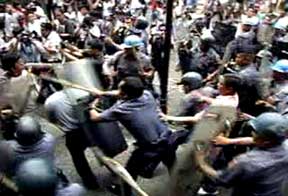HUMAN RIGHTS WATCH
Denial of Permit to Rally Unlawful –
Constitutionalist
A constitutional law
professor says that even with the no-permit-no-rally policy, applications
for permits to rally cannot be denied. In another interview, an activist
leader said that the policy – a Marcos edict - reflects the “extreme
paranoia” of a government increasingly isolated from the public.
BY ALEXANDER MARTIN REMOLLINO
Bulatlat
Taking issues to the streets is a legal
form of protest. But instead of respecting this right, government has
resorted to ways both cruel and unusual as cause-oriented groups and
individuals try to send their message across to motorists and passers-by.
|
For instance, the
Alliance of Health Workers (AHW) and the Health Alliance for Democracy
(HEAD) were supposed to observe Health Workers’ Day last May 6 with a
rally at the foot of the Chino Roces Bridge in Manila, near the
presidential palace. However, they were stopped by the anti-riot police
before they could even leave the Philippine General Hospital (PGH), the
country’s main state hospital, where they had assembled. They were then
forced to hold a program within the PGH compound.
|

Police truncheon ralliers during April 7 dispersal in Malate, Manila
Bulatlat File Photo |
The police claimed
that the demonstrators’ application for a permit to rally remained
unapproved by the Manila
City Hall until the day of the rally
itself.
BP 880
The
no-permit-no-rally policy is based on Batas Pambansa (BP) 880 or the
Public Assembly Act of 1985. Sec. 6, paragraph (a) of BP 880 – enacted
during martial law - provides that an application for a permit to rally
should be acted upon within two working days by the mayor of the city or
municipality where a rally is to be held, after which the permit is deemed
granted.
In Manila, the recent
cases of violent dispersal were the April 7, 2005 rally led by Bagong
Alyansang Makabayan (Bayan, or New Patriotic Alliance) in Malate and the
July 13, 2004 prayer rally at the Plaza Miranda in Quiapo. Both rallies
protested against the U.S.-led wars of aggression.
Amie Dural,
secretary-general of the Promotion of Church People’s Response (PCPR)
whose members were among those hurt in the April 7 dispersal, recalled in
an interview with Bulatlat that Bayan applied for a permit to rally
in front of the Philippine International Convention Center (PICC) where a
summit of the Inter-Parliamentary Union (IPU) was being held that same
day. The permit was denied, she said.
In the case of the
July 13, 2004 rally, it was held in a venue declared a freedom park during
the presidency of Corazon Aquino.
Reyes v. Bagatsing
Lawyer Marvic Leonen,
who teaches Constitutional Law at the University of the Philippines (UP),
said in a separate interview with Bulatlat that even with BP 880,
the government cannot deny applications for permits to rally.
Leonen, who is also
UP’s legal counsel, cited the case of Reyes v. Bagatsing, in which
the Supreme Court (SC) said that freedom of speech cannot be suppressed,
but if ever the streets are to be used for the exercise of this right, the
State can only regulate as to time and place. “In other words, there is
supposed to be a balance between the rights of those who traverse the
streets and the rights of the ralliers,” Leonen said.
“The application for
a permit to rally should not be denied, but there should only be
regulation on time and place,” he added.
Regarding rallies held without permit, Leonen said that police should not
automatically use force to disperse ralliers. “There should be
negotiations first,” he explained. “But if all attempts at negotiation
have failed and the situation turns violent, the police could use force to
disperse the rally, but the force should be calibrated – not excessive.”
Dispersal
without negotiation
Dural recalled that the April 7 rally was dispersed without negotiation.
Scores of protesters were reported hurt in the dispersal, including PCPR
chairman Fr. Allan Jose Arcebuche, who sustained head and body injuries.
Also injured were a few journalists who covered the event, including
Bulatlat’s Ronald Escanlar, who held his press ID card when police
truncheoned him and tried to drag him away.
In rallies held at freedom parks, Leonen said that they should not be
dispersed even when the rallyers have no permit. Manila police cited the
absence of a permit to rally in explaining why the
July 13, 2004
rally at Plaza Miranda was dispersed with force. Several protesters were
hurt during the dispersal, including Bayan chairperson Dr. Carol Araullo,
who sustained a head wound that needed seven stitches.
“Extreme paranoia”
Dural said that the emphasis presently being placed on the
no-permit-no-rally policy reflects the “extreme paranoia” of the Macapagal-Arroyo
administration on demonstrations.
She also observed that in previous administrations, there were several
rallies without permit that were met with tolerance from the authorities,
unlike today. “This is because there are so many reasons for the people to
protest these days,” she said.
A survey by the socio-economic think tank IBON Foundation revealed that 58
percent of the respondents wanted a change in the national leadership.
Last January, the Social Weather Station (SWS) released the results of its
survey for last year’s fourth quarter, revealing the prevalence of
pessimism among Filipinos. This situation previously occurred only in 1984
(a year after the assassination of former Sen. Benigno Aquino, Jr.), in
September-October 2000 (the Juetenggate expose against then President
Joseph Estrada), and in March 2003 (the outbreak of the U.S.-led war on
Iraq, which the Macapagal-Arroyo administration supported). Ferdinand
Marcos, who was president in 1984, was deposed through a popular uprising
two years later; Estrada suffered the same fate in 2001.
“We are no longer surprised that the government would do everything to
suppress the people’s rights these days,” Dural said. Bulatlat
BACK TO
TOP ■
PRINTER-FRIENDLY VERSION ■
COMMENT
© 2004 Bulatlat
■
Alipato Publications
Permission is granted to reprint or redistribute this article, provided
its author/s and Bulatlat are properly credited and notified.